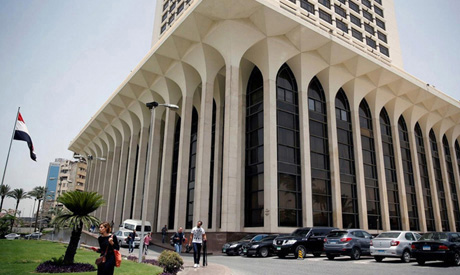
Egyptian Foreign Ministry headquarters
Egypt slammed on Thursday the statements of Ethiopia’s foreign ministry spokesman Dina Mufti, made on Tuesday, regarding Cairo’s internal affairs, describing them as a “flagrant transgression.”
Egypt’s foreign ministry spokesman Ahmed Hafez said Mufti's statements on Egypt were "totally unacceptable."
Mufti, Ethiopia’s former ambassador to Cairo, claimed that Egypt "has turned Ethiopia into a threat" and that the Grand Ethiopian Renaissance Dam (GERD) would cause thirst and hunger for Egyptians, reflecting on the "depth of the internal crisis in Egypt."
“The statements represent a blunt violation of commitments scribed in the constitutional foundations of the African Union, which stipulate clearly in its fourth article a commitment by member countries on non-interference in other countries’ internal affairs,” Hafez said.
"This is considered a violation of established African values which promote fraternity and respect for the other," Hafez added.
The Egyptian foreign ministry summoned the Ethiopian chargé d'affaires to Cairo on Wednesday to clarify the background of Mufti's statements.
A day earlier, according to news reports, Mufti criticised Egypt’s approach towards the GERD, which Ethiopia has started building on the Blue Nile in 2011.
Mufti also claimed that Egypt "is doing this to create a distraction from its internal problems," and to blame Ethiopia on the near-finished dam.
In response, Hafez stressed on Thursday that the transgression against the Egyptian state and the interference in its internal affairs are nothing but "a continuation of the approach to employ an aggressive tone and to inflame emotions."
This approach, Hafez added, aims at covering the "successive Ethiopian failures" on multiple levels, internally and externally, whereas Egypt has always preferred to refrain from discussing the internal developments in Ethiopia.
"The Ethiopian spokesperson should have paid attention to the deteriorating conditions in his country, which is witnessing many conflicts and human tragedies that have led to the killing of hundreds and the displacement of tens of thousands of innocent citizens," the Egyptian foreign ministry spokesperson said.
The latest of such Ethiopian incidents are the events in the Ethiopian Tigray and Benishangul regions in full view of everyone, as well as the continuous tension and instability in the Oromia region, he noted.
The war in the Tigray region between the Tigray People's Liberation Front (TPLF) and the Ethiopian government troops has been ongoing for several weeks. According to Reuters, it has killed hundreds and probably thousands, sent tens of thousands of refugees across the border into Sudan, enmeshed Eritrea, impacted a peacekeeping mission in Somalia, and heightened frictions between Ethiopia's myriad ethnic groups.
On Friday, Reuters quoted a volunteer from the country's Red Cross as saying that the death toll from an attack on 23 December in the western Benishangul-Gumuz region of Ethiopia has risen to 222 people.
This, Hafez added, comes in addition to the Ethiopian continuous hostile practices towards its regional surroundings, including what the border strip with Sudan has witnessed recently in terms of military actions and escalating tension.
There have been armed clashes between Sudanese and Ethiopian forces in recent weeks. Tensions in the border region have flared since the outbreak of conflict in Ethiopia’s northern Tigray region in early November and the arrival of more than 50,000 mainly Tigrayan refugees in eastern Sudan.
On Saturday, the Sudanese information minister said that Khartoum has taken control of most of the land it accuses Ethiopians of encroaching upon near the border between the two countries.
Short link: